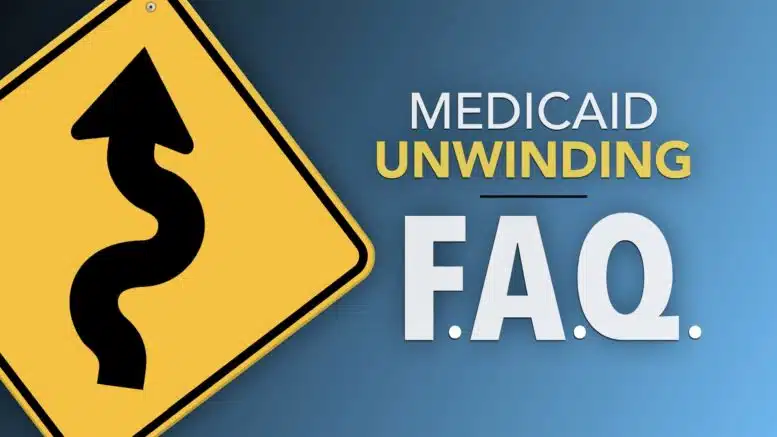By Jaymie Baxley
A federal provision that prevented states from kicking Medicaid participants off the rolls for the first three years of the COVID-19 pandemic has expired, leaving an estimated 300,000 North Carolinians at risk of losing coverage in the coming months.
The so-called unwinding of the continuous coverage mandate will require the N.C. Division of Social Services to redetermine the eligibility of the state’s 2.9 million beneficiaries for the first time since March 2020 — an unprecedented undertaking that some advocates fear could trigger a wave of unwarranted terminations.
Redeterminations were conducted regularly before the pandemic, but many current enrollees have never gone through the process. Medicaid enrollment in North Carolina grew by more than 740,000 people while the continuous coverage provision was in place.
Here are answers to some questions that participants might have about the unwinding and how it could affect their benefits.
Am I at risk of losing Medicaid?
It depends on if your circumstances changed during the pandemic.
Generally speaking, Medicaid eligibility in North Carolina is based on an individual’s income and medical needs. If you or your spouse are now making more money, you may no longer qualify for coverage.
There are several scenarios to consider. If a person is earning slightly more than they did two years ago but has since had a child, they may remain eligible because the income threshold is higher for larger households. On the other hand, a parent whose child is no longer under the age of 18 could lose coverage.
Some groups are more likely than others to be disqualified because of eligibility issues. Some of these groups include:
• Individuals with disabilities who began working during the public health emergency;
• Individuals who are older, blind or disabled and now receive Social Security benefits that exceed the federal poverty level;
• Parents and caregivers of children with increased incomes or whose children are now 18 or older; and
• Young adults who turned 19 to 21 years old while the continuous coverage provision was in effect.
None of those situations apply to me. Could I still lose coverage?
Even if your circumstances haven’t changed, your local Medicaid caseworker may need to verify that you continue to meet all the criteria for coverage.
According to the state’s unwinding plan, your county DSS will attempt to review most cases automatically “without any contact with the beneficiary.” However, in some cases, the agency may not have all the information needed to automatically determine a person’s eligibility.
If your local or county DSS office sends a letter requesting additional information and you fail to respond within 30 days, your coverage could be terminated.
What can I do to avoid termination?
The most important step is confirming that the state has your current mailing address, phone number and other contact information on file.
If you recently moved or changed numbers and need to update your information, you can do so by calling your local or county DSS office. You can also update your information through ePASS, the state’s online portal for Medicaid beneficiaries.
When will my case be up for review?
Instead of prioritizing specific populations for redetermination, the state plans to schedule cases “based on the beneficiary’s existing renewal date” over the next 12 months.
For most individuals, that will occur one year after their last renewal or original approval for Medicaid. If you are unsure of when that was, you can use ePASS or call your local DSS office to check.
What options do I have if my coverage is terminated?
You may qualify for coverage through the federal Health Insurance Marketplace.
People usually have only 60 days to enroll in a marketplace plan after losing Medicaid, but the Centers for Medicaid and Medicare Services has created a special enrollment period for individuals affected by the unwinding. If your Medicaid coverage is terminated, you can apply for marketplace coverage at any time through June 31, 2024.
What if I am wrongfully terminated?
If you believe the state erred in denying your eligibility, you can file an appeal.
Appeals can be filed for up to 60 days following a notice of termination, but it’s better to take action early. The Charlotte Center for Legal Advocacy advises that individuals who file within the first 10 business days can request continued coverage while their appeal is under review.
If you remain eligible for Medicaid but your coverage is terminated because you failed to respond to a request for information or never received the request, your benefits should be reinstated if you provide the information to DSS within 90 days.
If I lose coverage, will I be able to get it back through Medicaid expansion?
Possibly. The N.C. Department of Health and Human Services has confirmed that many individuals who lose coverage will become eligible again under Medicaid expansion.
Expansion is expected to benefit hundreds of thousands of people with incomes that are less than 138 percent of the federal poverty level for their family size — up from the previous limit of 100 percent. A single mother of two, for example, will be allowed to make $34,300 a year instead of $24,860.
The issue is timing. Terminations are set to begin in July, but expansion will not officially take effect until a state budget is approved, creating a monthslong coverage gap for expansion-eligible North Carolinians who lose Medicaid during the unwinding.









